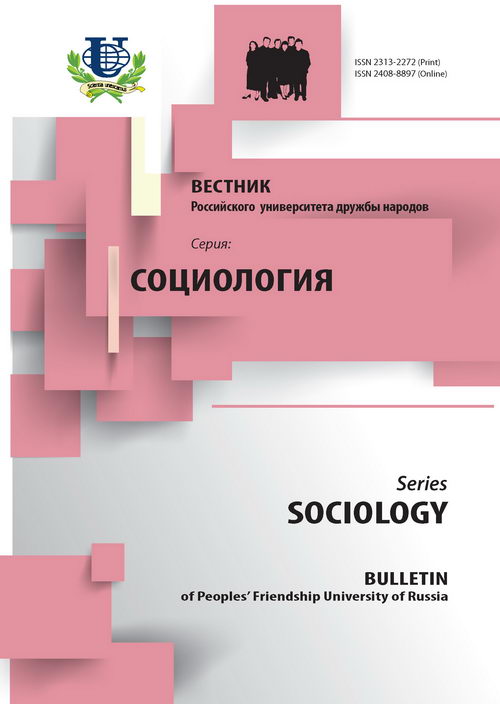Normative social morphogenesis and the opposition “agency-structure”: From individual to institutions, and back
- Authors: Podvoyskiy DG1
-
Affiliations:
- Peoples’ Friendship University of Russia
- Issue: Vol 16, No 3 (2016)
- Pages: 465-482
- Section: Theory, Methodology and History of Sociological Research
- URL: https://journals.rudn.ru/sociology/article/view/13995
Cite item
Full Text
Abstract
Sociological theory at any stage of development requires permanent reflection and comprehension of its own conceptual bases including its terminological axiomatic, which incorporates both the antinomy “subject (action, agency) and structure” and concepts of order, norms and rules, standards, cultural patterns and values, institutions, social control, power and coercion, conformism, deviation, etc. Conceptual descriptions of the opposition “agency-structure”, the problems of social order and mechanisms of normative and institutional “morphogenesis” traditionally act as one of the main “paradigmatic” axes for the development of sociological theory, and their critical analysis and comparison clarify the general methodological basis of social knowledge as a whole and highlight the fundamental demarcation lines between different schools and branches of sociological thought. The author attempts to provide a preliminary reconstruction and revision of the general argumentation used in social theory to explain how normative orders emerge from the internal logic of social interaction that takes place at different levels including everyday life. The article aims to assist in producing a clear and prominent vision of the issues of the dualism of agency-structure in social relations and of their normative, “rule-oriented” nature.
About the authors
D G Podvoyskiy
Peoples’ Friendship University of Russia
Author for correspondence.
Email: dpodvoiski@yandex.ru
Moscow, Russia
References
- Bruner J.S. Psihologija poznanija. Za predelami neposredstvennoj informacii [Beyond the In-formation Given. Studies in the Psychology of Knowing]. M.: Progress, 1977.
- Volkov V.V. «Sledovanie pravilu» kak sociologicheskaja problema [«Following the rule» as a sociological problem]. Sociologicheskij zhurnal. 1998. No 3/4.
- Dewey J. Obychaj i privychka [Custom and habit]. Interakcionizm v amerikanskoj sociologii i social'noj psihologii pervoj poloviny 20 veka. M.: INION RAN, 2010.
- Kovalev A.D. Problema ontologicheskogo statusa i rabochej modeli social'nyh institutov [The problem of the ontological status and the applied model of social institutions]. Novoe i staroe v teoreticheskoj sociologii. Pod red. Ju.N. Davydova. Kn. 4. M.: IS RAN, 2006.
- Rutkevich A.M. Teorija institutov A. Gelena [A. Gehlen’s theory of institutions]. Sociolog-icheskaja teorija: Istorija, sovremennost', perspektivy. Al'manah zhurnala «Sociologicheskoe obozrenie». SPb.: Izd-vo «Vladimir Dal'», 2008.
- Sumner W.G. Narodnye obychai: Issledovanie sociologicheskogo znachenija obychaev, maner, privychek, nravov i jetiki [Folkways: A study of mores, manners, customs and morals]. Rubezh: Al'manah social'nyh issledovanij. 1998. No 12.
- Winch P. Ideja social'noj nauki i ee otnoshenie k filosofii [The Idea of a Social Science and its Relation to Philosophy]. M.: Russkoe fenomenologicheskoe obshhestvo, 1996.
- Shmerlina I.A. Ponjatie «social'nyj institut»: analiz issledovatel'skih podhodov [The concept of «social institution»: An analysis of research approaches]. Sociologicheskij zhurnal. 2008. No 4.














